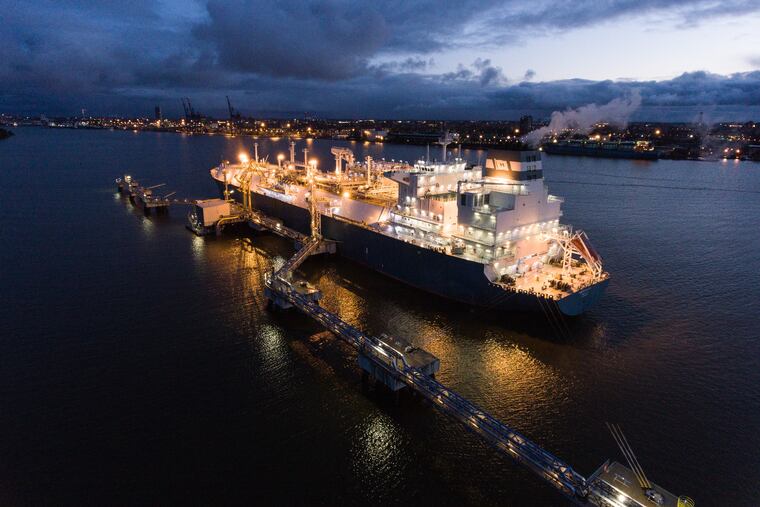Putin’s Ukraine aggression has boomeranged as Europe finally seeks to end Russian gas blackmail | Trudy Rubin
Facing the threat of a Russian energy cutoff to Europe if the Ukraine war continues, Lithuania shows the way toward energy independence from Moscow.

Russia’s brutal invasion of Ukraine has jolted Western Europe to take actions Vladimir Putin probably never expected.
Hours after Moscow’s army crossed into Ukraine on Tuesday, Germany’s Chancellor Olaf Scholz did something that looked impossible only weeks ago: He officially shelved the controversial Nord Stream 2 pipeline project set to deliver Russian natural gas directly to Germany.
And next week the European Union will — finally, after decades of debate — announce a strategy to slash its dependence on Russian energy flows.
» READ MORE: Russia-Ukraine live updates: Russian troops in place for an attack as Biden and Putin signal larger conflict
Dependence on Russian gas and energy has often prevented the EU and Germany from pushing back against Putin’s machinations. But Putin’s most recent aggression has finally awakened Western Europe to the danger of relying on Moscow to stay warm.
“For a long time we [Western Europeans] talked about energy diversification and nothing happened,” I was told by Lithuanian Vice-Minister of the Economy and Innovation Jovita Neliupšienė on my recent visit to Vilnius, the nation’s capital. “In crisis is opportunity. We have to take action. Then we can say, ‘We can’t be blackmailed.’”
The vice-minister knows what she is talking about.
The small Baltic state of Lithuania realized nearly 15 years ago that energy independence from Russian gas and pipelines is a strategic issue, not an economic one. In other words, even if it costs more, it is a necessary step to prevent Russia from using energy blackmail to force other countries to bend.
Lithuania learned this lesson early when Moscow temporarily cut off gas supplies in 1990 after Vilnius declared independence from the Soviet Union. “We had gas rationing, no hot water at home,” I was told by Lithuanian Vice-Minister of Energy Albinas Zananavičius.
But the real lesson came in 2008, the vice-minister said. “When Russia occupied parts of [the Caucasus country of] Georgia, it was a real wake-up call. We recognized if they cut us off, we would be freezing.”
» READ MORE: Why Putin’s Ukraine aggression will change the world: An explainer on how we got here | Trudy Rubin
Lithuania decided to rent a floating storage terminal for liquefied natural gas (LNG) that pulled up to the port of Klaipeda in 2014. “At that time, our choice didn’t look obvious. LNG was way more expensive than gas transferred via pipeline. Many people at home opposed this, inspired by our dear Russian friends,” Zananavičius recalled.
But the LNG terminal helped insulate them from Russian energy manipulation. Sixty percent of their gas supply now comes via the LNG terminal; this guarantees supply (which can be expanded), and prevents Gazprom, Russia’s giant gas supplier, from price-gouging.
Zananavičius compares that with the current situation in Europe, where, he said, even before the invasion of Ukraine, “Russia attacked Western Europe by energy means.”
Before assaulting Ukraine this week, Moscow had already cut gas supplies to Europe by 20%-25%, said the vice-minister, despite sky-high gas prices. And Gazprom had deliberately failed to fill gas storage facilities it owned in Germany.
The logical conclusion: Putin was trying to ensure that German energy dependence, plus growing gas shortages, would prevent Germany from halting the certification of Nord Stream 2.
Indeed, Putin’s strategy worked until he sent his troops across the Ukrainian border. Even Scholz’s tough predecessor, former chancellor Angela Merkel, had insisted that the Nord Stream 2 pipeline was strictly an economic project needed to lower prices. And, in an astonishing conflict of interest, her predecessor, Gerhard Schröder — who already holds a senior position at Nord Stream — has been nominated to sit on the board of Gazprom.
Never mind that it was obvious that Putin intended Nord Stream 2 as political leverage to further ensnare Germany into dependence on Russia — and to punish Ukraine. Once Nord Stream 2 went online, most experts believe Moscow would have shut down one of the other two gas pipelines running from Russia to Europe — the one that ran through Ukraine — depriving that country of vital revenue.
Now, the invasion of Ukraine has provided a brutal wake-up call.
Energy diversification away from Russia is a long-term prospect. Renewables, like wind and solar, still provide only a small portion of Europe’s energy supply. So if the Russian invasion intensifies, and further Western sanctions are applied, Putin could choose to shrink or cut off gas flows to Europe.
This is especially problematic for Germany, which has closed almost all of its nuclear plants and gets 27% of its energy from natural gas, half of which comes from Russia. For the first time, Germany is now considering acquiring an LNG terminal — the decision Lithuania made long ago.
Still, most of Europe has already begun to diversify energy sources over the past decade, including building LNG terminals. Some analysts say Europe could make it through this winter without serious problems, even with a Russian gas cutoff, although prices will soar.
The Lithuanians, however, look at the price issue differently. They charge their gas customers a security tax. And they consider higher prices — for now — to be the cost of reducing dependence on a rogue nation. Their LNG terminal — which now gets 60% of its supply from the U.S. — guarantees they and their Baltic neighbor states, Latvia and Estonia, will be fine.
“If some countries in Europe had invested in LNG instead of pipelines, we’d have a different winter,” Zananavičius said. “It is a very good deterrent.”
Putin has finally woken up Europe to the urgent need to deter him — at least when it comes to energy. Let’s hope this sense of urgency moves West European leaders to do everything possible to support for the sovereignty of Ukraine.